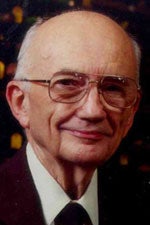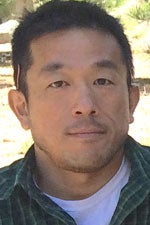Vernon Singleton, viticulture and enology professor emeritus known for trailblazing research and textbooks that are still used today, died Aug. 26 at the age of 93.
Remembrances
David Block, professor and chair, said the Department of Viticulture and Enology is collecting stories, photos and videos of Vern Singleton to share with his family during and after the celebration of life. If you have something to share, please send it by email to venchair@ucdavis.edu.
In lieu of flowers, Professor Singleton's family suggests memorial contributions to the following:
- Yolo Hospice, 1909 Galileo Court, Suite A, Davis 95618
- Vernon and Kathryn Singleton Enology Fund, Department of Viticulture and Enology, University of California, 595 Hilgard Lane, Davis 95616 (checks for this fund should be made payable to “UC Davis Foundation”)
“UC Davis V&E has lost a prominent member of our family,” David Block, department chair, said in a statement on the viticulture and enology website.

Singleton, who earned a Ph.D. in biochemistry at Purdue University, joined UC Davis in 1958. He would become an expert in wine chemistry — doing work that was not appreciated at first.
“His role in the science of wine was the characterization of phenolic compounds at a time when people didn’t think they were important,” said Roger Boulton, a professor in the Department of Viticulture and Enology.
But guess what? These organic chemical compounds affect the taste, color and texture of wine, and the industry took notice. Wine Spectator noted in its article on Singleton’s death that his research had helped generations of winemakers around the world better understand the chemistry involved in winemaking.
“Anyone who studied or worked in the Department of Viticulture and Enology at UC Davis was influenced by his deep understanding of grape and wine phenolic chemistry,” Carole Meredith wrote on her Facebook page. She is a professor emerita in the Department of Viticulture and Enology and proprietor of the Lagier Meredith winery in Napa.
Singleton published more than 200 papers and four books in a career spanning four decades. Among the latter, Wine: An Introduction for Americans “remains among the most widely read books of its kind, even decades after its last printing,” the Culinary Institute of America declared upon inducting Singleton into the institute's Vintners Hall of Fame in 2011.
He co-authored Wine: An Introduction for Americans with his UC Davis colleague Maynard Amerine, and joined with three other colleagues, Boulton, Linda Bisson and Ralph Kunkee, in writing Principles and Practices of Winemaking, a textbook used worldwide, according to the Vintners Hall of Fame.
In 1998, Singleton, Boulton, Bisson and Kunkee received the Office International de la Vigne et du Vin (OIV) Prize in Oenology for Principles and Practices of Winemaking. At the end of the 20th century, the prize was awarded infrequently, with as few as three or four books per decade gaining this prestigious recognition. This work became the core textbook for several decades of viticulture and enology majors, was printed in four editions, and even though it is now out of print, it remains widely sought after today.
“We will miss him as a true scholar, teacher, colleague and friend,” Block said. “He contributed so much to the department and to the global wine industry, from his trailblazing research on phenolic chemistry and wine aging to his textbooks that are still used throughout the world today educating future generations of wine professionals.”
Axel Borg, the UC Davis Library's subject specialist in viticulture and enology and other disciplines, said: “Professor Singleton’s work on polyphenolic substances in grapes was foundational to what has now developed into the fields of functional foods, such as those that lower blood pressure or have other health benefits.”
Singleton retired in 1991, maintained his home in Davis, and continued to consult with industry organizations, students and fellow scientists; review books and papers; and occasionally present papers.
He is survived by his wife, Kay; three children, Steve Singleton, Stan Singleton and Sue Singleton; and four grandchildren and four great-grandchildren.
The Department of Viticulture and Enology and Professor Singleton’s family will host a celebration of his life and career on Saturday (Sept. 10). People interested in attending are asked to contact Kay Bogart by email.
Kentaro Inoue killed in bicycle crash
Plant sciences professor Kentaro Inoue, 47, was killed in a bicycle crash Wednesday morning (Aug. 31) on West Capitol Avenue in Sacramento.

Police said Inoue and a Waste Management truck were both going west — Inoue, with a helmet on, riding in the bike lane — when the truck turned into Inoue’s path, and the bike and truck collided.
Sgt. Roger Kinney said Inoue was dead when officers arrived at 7:50 a.m. He said the collision appears to have been an accident, though the investigation continues and the report will be forwarded to the district attorney’s office. Kinney said the truck driver cooperated with police, and there was no indication the driver was impaired by alcohol or drugs.
Inoue is survived by his wife, Amy Brown, who completed undergraduate work in physiology at UC Davis and went on to receive a UC Davis doctorate of veterinary medicine in 2003. She is a veterinarian in Roseville.
Inoue’s friend Takao Kasuga, a U.S. Department of Agriculture researcher in molecular genetics in the Department of Plant Pathology, said Inoue and Brown were married in February. “He moved (from Davis) to her house in Sacramento and commuted to Davis by bike since then,” Kasuga said.
Tributes by Grad Students
“I have never known or worked with someone so dedicated to ensuring his/her students would be successful in the future. He relentlessly pushed us to be the best scientists we could be, and I am grateful to have worked with him for over two years.” — Lucas McKinnon, Ph.D. candidate, Inoue lab
“He was the chair of the program when I got accepted and I feel lucky I could count on his support during the beginning of my Ph.D. I am from Brazil and everything was new, challenging and exciting, but also scary for me. … At the end of orientation, Professor Kentaro asked me how I was feeling. I told him I was excited but definitely scared and worried if I could accomplish all of those requirements. He looked at me, and I will never forget what he said: ‘Cintia, if you are here, if we chose you to be part of the program, it is because we believe you can.’ I never forgot that and since then every time I struggle with classes or in the lab with my experiments I remember his words and they make me feel stronger to move on." — Cintia Sagawa, Plant Biology Graduate Group
“I was taking the plant biology core course, in which Kentaro was teaching metabolism in plastids. He was describing biochemical pathways, and asked us some questions. Knowing biochemistry and metabolism is a difficult subject for many of us, he joked, ‘Oh, no, that was the only class I got a C in college!’ I’ll always remember his passion in science, his humor and his dedication to education.” — Chenxin Li, Plant Biology Graduate Group
Kasuga had known Inoue since their days as postdocs at the Samuel Roberts Noble Foundation in Oklahoma. “When I first came to Davis, Kentaro helped me settle into the area, taking me hiking, to numerous restaurants and introducing me to the wine club he was a member of at that time,” Kasuga said. “He was generous, kind, a good friend and I will miss him.”
Inoue joined the UC Davis faculty in 2002 as an assistant professor in agricultural plant biology. “Kentaro was an outstanding scientist and a well-liked faculty member,” said Joe DiTomaso, professor and interim chair, Department of Plant Sciences. “He was always positive and friendly and will be missed both for his research and his personality.”
Students had honored Inoue for his teaching, voting for him to receive an ASUCD Excellence in Education Award. A write-up on the Department of Plant Sciences website stated: “Inoue’s students love how he makes agricultural plant biology so accessible, bringing to life topics such as plastid biogenesis, protein trafficking, protein maturation, membrane development, photosynthesis and isoprenoid metabolism.”
He was a native of Japan, where he received a Bachelor of Science, Master of Science and Ph.D., all in pharmaceutical sciences, all at the University of Tokyo.
Beyond his research, Inoue also had a passion for mountain biking. “Biking and research may seem very different,” Inoue said in an article in 2007. “But both require you to be focused, patient and determined to be successful. Each offers different rewards, but they are equally enjoyable to me.”
The article, “Beakers and Bikes,” appeared in the Samuel Roberts Noble Foundation’s Legacy magazine. Inoue spent two years as a postdoc at the Noble Foundation, having been guided there by UC Davis Professor Emeritus Eric Conn, who had met Inoue at a research conference and became his mentor.
Inoue moved from the Noble Foundation to Michigan State University for more postdoctoral work before joining UC Davis.